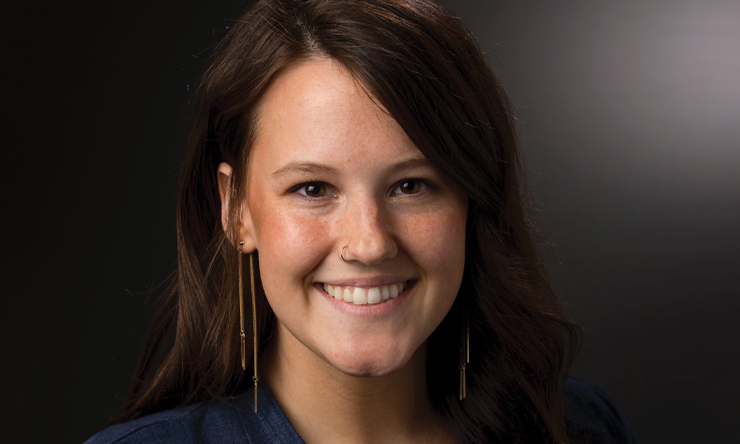Scene Magazine | Summer 2008
Call Rev. Robert "Bud" Grant '80 at home and his voice will be only one of many sounds on the other end. You'll hear chickens and geese, frogs, possibly a duck and probably the wind. His rooster crows every few seconds. He's outside on his cell phone, and his farm is a noisy one.
To say the very least, Grant is an environmentalist. He serves on environmental committees both locally and at the state level; he helped produce a storm water mitigation plan that has changed both St. Ambrose University's and Davenport's water collection and retention practices. He has encouraged the use of native plants and helped create the Peace Prairie on campus. He championed the creation of Ambrose's interdisciplinary minor in environmental studies.
A theology professor, he also teaches Environmental Ethics, a course with roots deeply planted in philosophy and theology. This past spring semester, the class's experimental project-to assess the ethical appropriateness of various green practices-produced a document now headed for the Iowa Climate Change Advisory Council (ICCAC). The students who researched and drafted the document hope it ultimately will be used at all of Iowa's colleges and universities to grade each institution's progress in becoming a green campus. It includes practices such as geo-thermal heating and cooling, solar energy, wind energy and storm water mitigation.
Working documents aside, this course represents a departure from most discussions about environmental responsibility. That is, these students didn't learn how to slow global warming or save the whales; they did not analyze cost/benefit ratios in support of implementing green policies. Instead, they researched the philosophical and theological basis of environmentalism. They argued about what makes us human. In the end, they came to consensus, turning their theory-that environmental practices should be adopted because it is the right thing to do-into practical application.
It is the Catholic intellectual tradition at its best.
"Thomas Aquinas said that human beings should be willing to suffer for the good of another," Grant says. "Environmental suffering is happening, mostly to the poor and marginalized. One out of every three people on the planet is suffering. How are we going to more justly distribute the suffering?"
In other words, how are we going to take on our fair share?
Reading Aristotle, Aquinas and Kant, the students fused their own ideas into an ethical statement that would guide them throughout the semester. The statement-"Because humans are responsible for ecological crises, human endeavors should be conducted in a way that ensures the sustainability and flourishing of both humans and the environment as a whole"-provided the framework for their thinking. The next step was to formulate a method for grading environmental practices of educational institutions.
"Once we agreed on the ethical statement, we articulated four duties that derived from it. They include duty to the future, the environment, human flourishing and particularly to the just distribution of inevitable sacrifices. Within each of those duties, we proposed a set of measurable rubrics for assessing how well each green practice is working," says Grant.
The practices-from bio-fueled vehicles to porous parking lots-were researched, both for practicality and as used at St. Ambrose. They were evaluated according to the ethical rubrics fashioned after Kant and Aquinas. Focusing on such considerations as whether a practice caused or impaired the flourishing of human beings, for example, the rubrics gave a picture of the level of human suffering caused or ameliorated by it.
"As the Green Bees Environmental Ethics Consultants, our goal was to evaluate the ethical behavior of an institution, and we started with ourselves," Grant says. "We were not interested in whether a practice would pay for itself over time."
Rather, they evaluated questions such as whether St. Ambrose's storm water mitigation program helped the environment, promoted human flourishing and provided an opportunity for environmental education. (It does.)
"Some things will pay for themselves over time and some won't," Grant says. "The point of this work was, are we doing the right thing? To implement a meal plan change to promote less waste would probably actually cost money, not save it. But encouraging students to not waste is the right thing to do."
Grant's students were on board from the start. As already avid recyclers, bicyclists and energy conservationists, however, what did they stand to learn?
"It was one of my top-favorite classes at St. Ambrose," says Nicole Cathelyn Rowold, a senior from Geneseo, Ill. "It changed me. I was into the environment before the class, but the things I learned inspired me. Grant said being a person of character-being virtuous in every possible way, no matter whether it benefits you or not-is the strongest compliment. I now have that as a goal in my life. This was more than an environmental class. The ethics and theology enlarged it."
They helped spawn arguments, as well.
"I liked the ideas, the philosophy," says Michelle Ramsey, a senior who joined classmate Matthew Hennes at the SAU Bookstore to chat about the class. She says the class has made her more aware of her responsibility, and offers the evidence: She plans to take her plastic soda cup home for recycling. "Getting the whole class to agree on equitable distribution of suffering was the hardest thing, though."
Matthew-the self-acknowledged source of many of the arguments-grins and nods.
"I didn't agree with the Beatitudes-derived philosophy that accepting suffering on behalf of others makes you closer to God." For someone with atheistic beliefs such as himself, he says, "There goes that argument out the window."
Nevertheless, Matthew agrees with his classmates that the final document is an important result of the class.
"I'm proud of our document," he says. "It is a positive and tangible result of our work."
Sister Joan Lescinski, St. Ambrose's president, agrees. As a guest at the final student presentation, she reviewed the document, which didn't sugar-coat St. Ambrose's scores. They ranged from high in storm water management to low in alternative energy sources.
"It's your responsibility, your mission to lead the way environmentally," she told the class. "You have the power to raise our environmental consciousness, to raise questions such as you have today."
She believes that, although "greening" is still in its early stages, it will become as commonly accepted as handicapped accessibility has.
"Thirty years ago, it just didn't occur to us to take into account accessibility issues when building new buildings," Lescinski says. "Now we wouldn't even think of building a facility that wasn't completely accessible. In fact, it's now against the law. We must get to the point where a certain standard of environmental practice is not an option but a given."
Justin Heaton, a junior who's also from Geneseo, agrees.
"This whole green phase isn't just a fad," he says. "It's what younger generations will have to embrace for the rest of their lives. I believe that this behavior will become part of normal everyday life in the next five to ten years. We have the technology, and we can overcome these issues if everyone participates by doing little things that have a huge impact overall. If humans can fly to the moon, there's no reason why we can't make the switch to clean, renewable energy."
The university's report card shows room for improvement, to be sure, but, as Grant points out, isn't out of line with what might be expected from another similar institution in 2008. The students hope that the Environmental Ethics document will be approved by the ICCAC for other Iowa colleges to adopt the assessment tools as well.
"We'd like to create a student-based, Iowa-wide council to evaluate and advise colleges on the green practices that are delineated in our document," Grant says. "Sharing best practices and collaborating on methods will be the ideal result. We can share information about our storm water management practices while someone else might be able to share on the subject of geo-thermal heating and cooling."
The timetable must be swift: In order to reduce campuses' carbon footprints in accordance with the State of Iowa's goals of 15 percent by 2010, there isn't much time to lose. The next hoped-for step will be an environmental summit of Iowa colleges and universities to be held at St. Ambrose next spring.
But, Grant reiterates-as he has all along with his students-such outcomes are essentially beside the point.
"Real spirituality-the core of environmental spirituality-means that you do what you do because it's the right thing to do," he says. "The idea of making a sacrifice for the sake of God's creation and the ability to choose to do that makes us human. It's the heart and soul of it."
In fact, there's an undesirable consequence to being motivated by a hoped-for end result: It might not happen.
"You can't do any good work for long if you need to see yourself making a difference," Grant says. "Even if you don't burn out, you are engaging yourself in a commercial exchange of goods and services-‘If I do this, then I can expect that.' This is about the journey, not the destination."
It's about the journey, as Grant puts it, of your authentic self.
"You have to do things because they are the right things to do, not as means to an end. It is spiritually illegitimate to do something because you want to make a difference. The Gospel says just do it; the consequences are none of your business."
Grant is warmed up now, speaking from his most authentic self: He says what he says and does what he does because he has to. It's the right thing to do.
"Let me tell you a Zen Koan riddle," he says. "A priest is dangling from a high branch by his teeth. A disciple comes along and asks him what the path to enlightenment is. If the priest answers him, he will plummet to his death. But if he doesn't answer, he will deny his vocation. My answer, and this is the right answer, is that he plunges to his death without uttering a single word. His sacrifice-his dying-is the answer.
"If this project gets adopted by the state of Iowa, I'll be satisfied. But it's not why we did it in the first place. And I hope to teach the students that. It's about the spiritual journey."
Or, as Grant paraphrases his favorite Immanuel Kant quote, "I'm not telling you it's possible to do the right thing, only that it's what is necessary if you want to be ethical."
News
Share This Story



